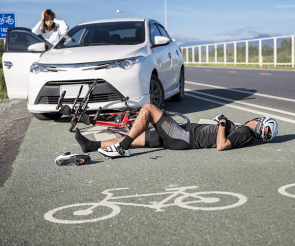What to do if you are involved in a cycling accident
It’s 2020 and we have entered a new decade. As part of a healthy start you may have decided to join the number of commuters who cycle to work. Many of my colleagues at work have spent years safely cycling to the office, but what do you do if you are involved in an accident?
Steps to take following an accident
The following is a guide (depending upon the extent of your injuries):
- Telephone the police to report the incident – you are required to do so and it is illegal not to, especially if you or someone else has been injured;
- If you are physically able to, exchange details with any other party involved (name, address, car registration and insurers) and if you can, take details of any passengers and witnesses;
- If you are injured of course call an ambulance if necessary and/or go to A&E or see your GP as soon as you are able to.
If the accident was caused by someone else

If the accident was caused by someone else and you were injured as a result, I suggest instructing a solicitor/legal advisor. Whilst you have 3 years from the date of the accident in which to issue Court Proceedings and make a claim, to avoid any evidence being lost over the years, it is often helpful to seek legal advice as soon as possible after the accident.
Your legal advisor/solicitor will then be able to assist you to formulate your claim, help you obtain treatment for your injuries and instruct independent medical experts to provide the evidence to support your injuries.
It will help with any claim that you make if you do the following:
Photographs
If you have a phone with a camera, take a photograph at the scene including the direction in which you were travelling and directions of travel of other parties involved. If you are unable to do so because of your injuries, it will be helpful if you are able to ask a friend or family member to subsequently attend the scene with you and take photographs showing the road layout.
If the accident was caused by a defect in the road, you may be able to claim compensation from the local authority for failing to maintain the carriageway. You will need to take a photograph of the defect and use a ruler to show the depth of any potholes.
If the accident was caused by an oil spillage it may still be possible to claim. Again photographs will assist as will details of any witnesses.
Photographs of any injuries sustained will also be helpful.
CCTV
Enquire as to whether any is available and which may show what happened. The police are only likely to obtain private CCTV if the police deem the accident to be very serious . You therefore may wish to make your own enquiries. Please note that many places wipe footage after a few weeks or so.
Receipts/documents to support losses
Remember to keep receipts in respect of any expenses that you incur.
Obtain a quote with regard to the damage to your cycle. You may be able to claim for the damage under your household insurance policy if you have one or via the other party, if the accident was not your fault.
If you are unable to work and wish to claim loss of income, send your solicitor copies of your wage slips for the 13 weeks prior to the accident together with copies of any wage slips that you receive whilst you are unable to work after the accident.
If you are self- employed and wish to claim loss of income, you will need to provide copies of your tax returns for the 3 years prior to the accident so that your net average income can be calculated and compared against the income that you receive after the accident. Your legal advisor will be able to advise you on further documentation that will be required and or expert evidence that can be obtained, depending upon your circumstances.
Treatment/rehabilitation
Seek advice via your GP for suitable treatment to assist your recovery. You may also be able to obtain some treatment as part of your claim if the accident was not your fault, but the first point of call should always be via your GP.
If you have private health insurance and you receive treatment under your policy, remember to let your health insurers know if you are making a claim, as it may wish to include its outlay.


